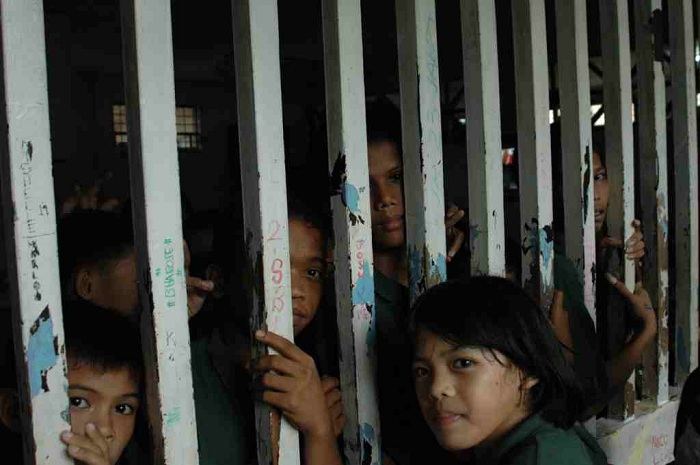They say a picture paints a thousand words. So when netizens saw the photo of a malnourished child in Manila, they obviously had a lot to say about it. The photo easily became viral, especially when local media giants ABS-CBN and GMA caught wind of it.
A Picture With a Purpose
On Oct. 23, Bahay Tuluyan, a Filipino non-government organization (NGO) that works with children in need of special protection, posted a photo of a “severely malnourished, unwell, completely naked” child who was “lying on a cement floor, outdoors” of the Manila Reception and Action Center (RAC), a temporary shelter for vagrants or victims of domestic abuse. On the date the photo was taken, the NGO noted that the boy had been with the shelter for 7 months already but had not received any medical treatment whatsoever. When he was turned over to the NGO for transfer to a better shelter, it saw that the boy had a black eye and results of initial medico-legal exams indicated he had “multiple injuries secondary to mauling”.

Bahay Tuluyan posted the photo to create awareness among Filipinos of what’s happening inside the closed doors of RAC and most importantly stir them into action, especially those in a position of power and authority.
“’The conditions inside RAC are abysmal. Children are detained in this center without charge yet are treated worse than criminals. They are denied the most basic rights – adequate food, clean water, bedding and even clothing. Moreover, not only are children denied contact with their families but their families are often not even notified that they are being held inside RAC. … This horrific treatment of children cannot continue. Adequate policies and laws exist in the Philippines to regulate the running of child caring institutions to appropriate standards yet this institution, run by government, falls far below those standards.” –Bahay Tuluyan
This article by Inquirer let’s you in on what Catherine Scerri, deputy director of Bahay Tuluyan, witnessed when she took the picture on Oct. 12. (Spoiler: Scerri called RAC a “concentration camp”.)
Where There’s Smoke, There’s Fire

Expectedly, Dr. Shiela Pangan, officer-in-charge of the Manila Department of Social Welfare (MDSW) which manages RAC, has denied the allegations hurled against the shelter. Pangan insisted during an interview with GMA 7’s 24 Oras that all the children in the shelter were “properly fed and were never abused”.
Meanwhile, RAC Acting Chief Gloria Antonio explained the facility was oftentimes crowded and operating at over-capacity and that the photo posted in FB was “below the belt”. But for every defense Antonio laid out, a former on-the-job trainee at the RAC has a point-by-point response.
Also Read: 3 Reasons Why SIM Card Registration in the Philippines Might Be A Bad Idea

It should be noted the Bahay Tuluyan has pushed for the RAC’s upgrade or closure since 2008, which it is still recommending now. Unfortunately, the NGO has noted no or little progress in the “conditions in the RAC during that time”. Other individuals and organizations have tried to have RAC reformed since 1994, says Scerri. But cases brought up in complaints were easily shrugged off as “isolated cases” and nothing ever happened of it—until now, when media coverage pressured politicians to act.
“They only responded now that (the controversy) is in the open.” —Lily Flordelis, executive director of the charity.
Surprisingly (or unsurprisingly), allegations of misbehavior of RAC staff and issues of abuse within the shelter’s confines are not new. In 2008, a 16-year-old was allegedly raped by DSWD volunteers. More recently, in 2010, a homeless man was caught in the act of raping another teenager.
The State of Children’s Shelter in the Country

These serious allegations against the RAC has resulted in the creation of a fact-finding team from DSWD “to look into the conditions” of the Manila shelter. If needed, DSWD Secretary Corazon Soliman stated the national government is “ready to help” the city of Manila to “improve the condition” in the RAC.
Manila Mayor Joseph Estrada, for his part, told AFP he has “already ordered an investigation for that”. “They (the media) are just trying to blow it (the issue) up,” Estrada added. Some may agree with the mayor—the Philippine media has a tendency to sensationalize and over-report—but some issues may need the prolonged spot in the limelight.

These allegations against RAC, both past and present, tell us that something is amiss with how RAC is managed and that there really is a need for the government to look deeply into the allegations of abuse and neglect of RAC staff. If the allegations are found to be true, the government needs to find or create solutions to address the root cause of these problems. If the RAC lacks manpower, hire more people or ask more people and organizations to volunteer. If it lacks money for provisions such as clothing and food, perhaps a bigger budget is appropriate or donations be requested.
Essentially, RAC is a reminder that the government needs to re-evaluate its programs, review budget allocated for these shelters and revamp management, if needed. But perhaps the bigger question that needs to be asked is: could RAC’s predicament imply the same or similar problems with the rest of these institutions in the country? Are they operating within standards set by the DSWD or not? Are they undermanned or have no budget? Are staff responsible or negligent and abusive? If no one is actually checking and monitoring these government-run shelters, we wouldn’t really know for sure.










